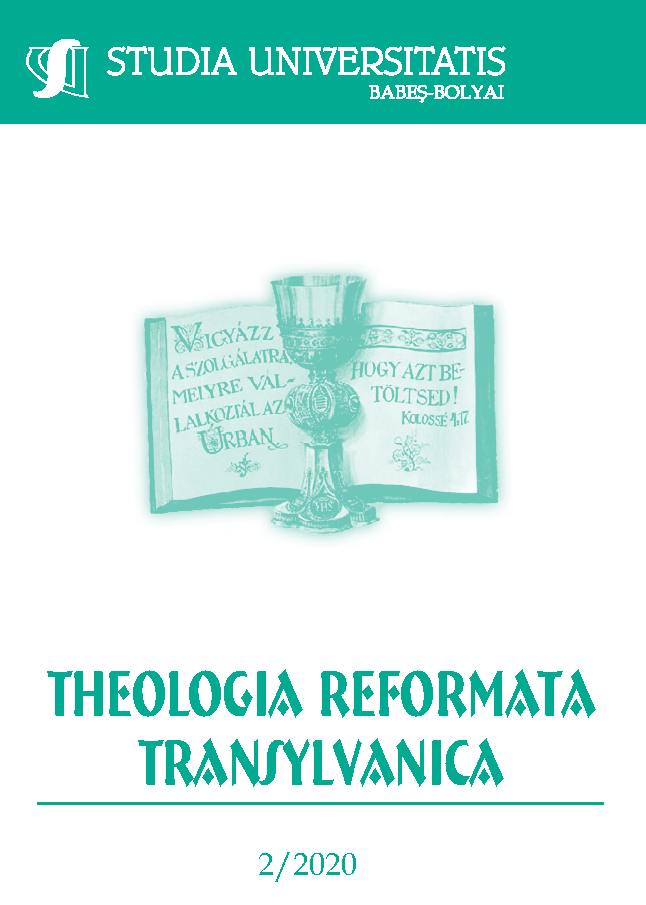Nationalism as a Question for Theology – A Few Remarks on a Dividing Issue
DOI:
https://doi.org/10.24193/subbtref.65.2.10Keywords:
national existence, nationalism, providence, sovereignty, responsibility.Abstract
Nationalism remains to be one of the most compelling issues of communities. It raises questions not only for humanities but for theology as well. Thus, we approach it from the perspective of Reformed theology with the aim of trying to find such a point of reference by which Christian thinking is able to pro-vide orientation in understanding this problem. The article first visits such basic definitions as state, nation, or people and attempts to define them. By providing inputs to this clarification from a theological point of view, the article investigates how the Christian doctrine of providence with its emphasis on the vertical dimension of human life can help us to avoid the absolutization of the notion of nation. One of the main points of the text is to differentiate between national existence and nationalism. Nationalism cannot be justified, such as decontextualized national existence since one of the main consequences would be a misunderstood concept of progress. A correctly articulated national existence always brings to the fore the concern for sovereignty. The article argues that a nation’s sovereignty from the Christian point of view can be neither detached from the sovereignty of God nor expressed without taking it seriously. Since proper sovereignty is only to be practised not against but for something, it always points to-wards God’s sovereignty.References
A. GERGELY, András (2002): A „végig nem beszélt” nemzet-képletek. In: Regio – Kisebbség, Politika, Társadalom 13, 4. 23–32.
ANDERSON, Benedikt (2006): Elképzelt közösségek. Gondolatok a nacionalizmus eredetéről. Budapest, L’Harmattan–Atelier.
BEINTKER, Michael (1994): Theologische Neuorientierung. Introductory lecture to the conference: Die Aufgabe theologische Neuorientierung in den evangelischen Kirchen Mittel- und Osteuropas, 4–7 March 1994, Berlin. In: Ev. Th. 55. 3–95, 211–217.
BERLIN, Isaiah (1992): Isaiah Berlin a nacionalizmus két fogalmáról: Nathan Gardels interjúja (Transl. by A. Péter Lázár). In: Világosság 33, 5. 344–347.
BRETTER, Zoltán – DEÁK, Ágnes (eds.) (1995): Eszmék a politikában: a nacionalizmus. Pécs, Tanulmány.
BUCSAY, Mihály (1973): A magyarországi református egyház és a nacionalizmus. In: Theológiai Szemle XVI. 261–268.
DEMETER, Attila (2009): Adalékok a nemzeteszme és a nacionalizmus értelmezéséhez. In: Limes – Tudományos Szemle 22, 4. 35–42.
DIECKHOFF, Alain (2002): Egy megrögzöttség túlhaladása – a kulturális és politikai nacionalizmus fogalmainak újraértelmezése (Transl. by Rita Kéri). In: Regio – Kisebbség, Politika, Társadalom 13, 4. 7–22.
DR. SEBESTYÉN, Jenő (1929): Neonacionalizmus és Kálvinizmus. Különlenyomat a Dunamelléki Református Egyházkerület budapesti Theológiai Akadémiájának az 1928/29-es tanévről kiadott Értesítőjéből. Budapest.
GAÁL, Botond (1997): Religious Minorities in Central-Europe and Their Relation to the Nation-State. In: Reformed World 47, 79–82.
GAZSÓ, Dániel (2015): Volt egyszer egy Trianon. In: Valóság 58, 8. 70–88.
GELLNER, Ernest (1992): Nacionalizmus és politika Kelet-Európában (Transl. by Mezei György). In: Világosság 33, 5. 332–338. (2009): Nations and Nationalism. Second edition. Ithaca–New York, Cornell University Press.
GRENHOLM, C. H. (1994): Nationalismus (entry). In: Theologische Realenzyklopädie (TRE). Bd. 24. Berlin–New York, De Gruyter. 21–28.
GYURGYÁK, János (2007): Ezzé lett magyar hazátok. A magyar nemzeteszme és nacionalizmus története. Budapest, Osiris.
HALL, John A. (ed.) (1998): The State of the Nation. Ernest Gellner and the Theory of National-ism. Cambridge, Cambridge University Press.
HERMS, Eilert (2004): Souveränität (entry). In: RGG4 Band 7 R-S. Tübingen, Mohr Siebeck. 1461–1462.
KÁNTOR, Zoltán (ed.) (2004): Nacionalizmuselméletek (Szöveggyűjtemény). Rejtjel Polito-lógiai Könyvek 21. Budapest, Rejtjel.
KOVÁCS, Gábor (2002): Nemzet, önrendelkezés, nacionalizmus Bibó István gondolatvilágában. In: Regio – Kisebbség, Politika, Társadalom 13, 3. 93–115.
LAJTAI, L. László (2005): Nemzet – történelem – szakralitás: a modernitás apoteózisa, avagy a nem nacionalista nacionalizmuselméletek buktatói. In: 2000 17, September. 10–17. (2015): Trendek és elméletek a nemzet-és nacionalizmuskutatásban: vázlatos kutatástörténeti áttekintés. In: Pro Minoritate 2015/3. 115–147.
MAGAŠ, Branka (1992): Vitám Ernest Gellnerrel. (Transl. by A. Péter Lázár). In: Világosság 33, 5. 339–344.
MICHNIK, Adam (1992): Egy fogalom határai (Transl. by A. Péter Lázár). In: Világosság 33, 5. 328–331.
NAGY, Levente (2001): A nacionalizmus természetrajza. In: Kisebbségkutatás 10, 1. 69–84.
SMITH, Anthony D. (2010): Nationalism: Theory, Ideology, History (Key Concepts). 2nd edition (revised and updated; Kindle edition). Polity Press, Cambridge.
ÖKUMENIKUS Tanulmányi Füzetek 1992/3. 9–16. Ökumenikus Tanulmányi Központ, Budapest.
SEBESTYÉN, Jenő (1993): Református etika. Budapest–Gödöllő, Iránytű.
SZŰCS, Ferenc (2005): Nacionalizmus a református teológia és az egyház megítélése szerint. In: Confessio 2005/3. 37–42.
TECHET, Péter (2008): Kontinuus vagy diszkontinuus szuverenitástörténet. Carl Schmitt és Jacques Maritain szuverenitáskoncepciójának összehasonlítása. In: Valóság LI, 12. 32–38.
Downloads
Published
How to Cite
Issue
Section
License
Copyright (c) 2020 Studia Universitatis Babeș-Bolyai Theologia Reformata Transylvanica

This work is licensed under a Creative Commons Attribution-NonCommercial-NoDerivatives 4.0 International License.






